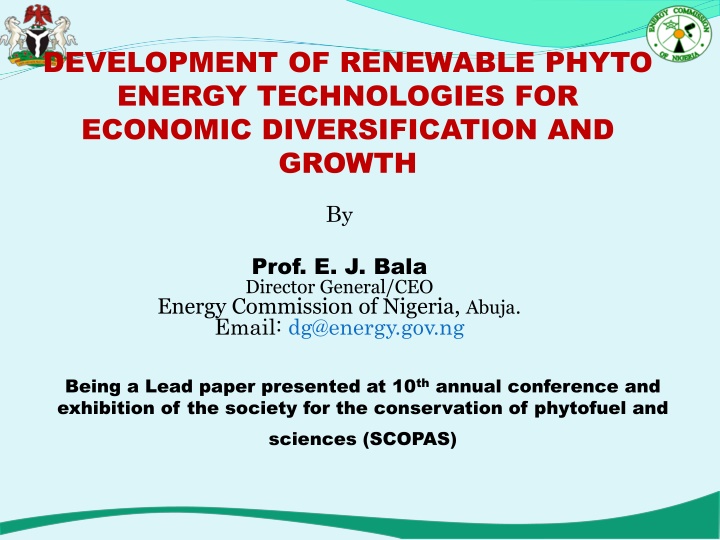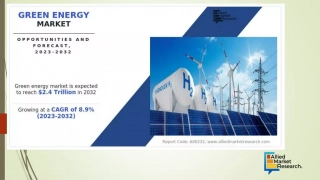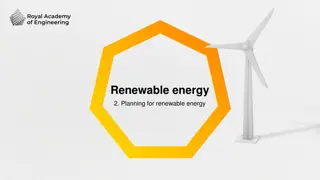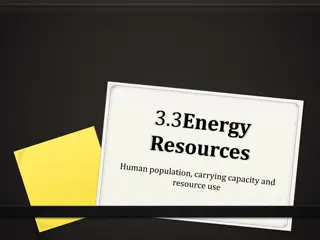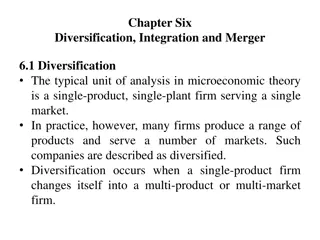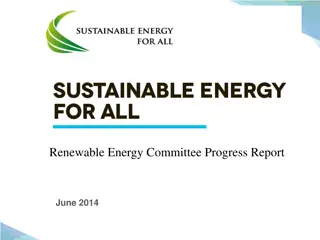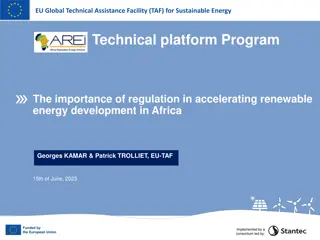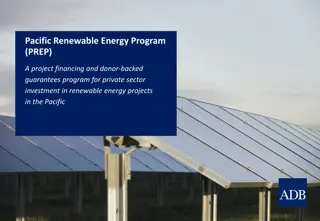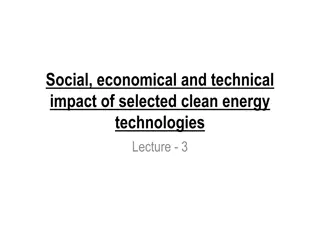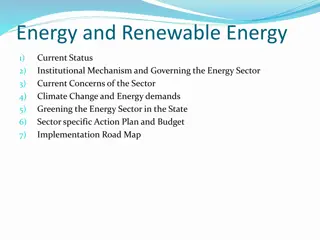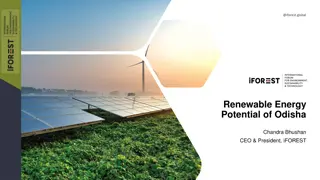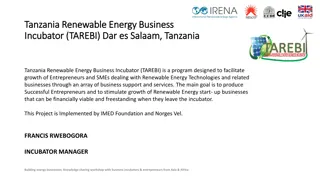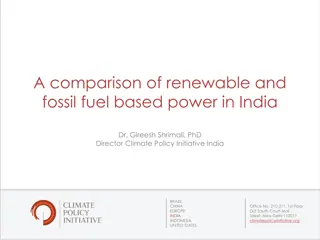Development of Renewable Phyto Energy Technologies for Economic Diversification
This paper by Prof. E. J. Bala discusses the advancement of renewable phyto energy technologies in Nigeria for economic growth and diversification. It addresses the existing energy resources, policies, and regulations on bio-energy and bio-fuels, emphasizing the need to reduce dependence on petroleum and promote sustainable energy sources. The content delves into future energy demand projections, biofuel production schemes, key drivers of bio-energy development, and concludes with recommendations for a more balanced energy mix.
Download Presentation

Please find below an Image/Link to download the presentation.
The content on the website is provided AS IS for your information and personal use only. It may not be sold, licensed, or shared on other websites without obtaining consent from the author.If you encounter any issues during the download, it is possible that the publisher has removed the file from their server.
You are allowed to download the files provided on this website for personal or commercial use, subject to the condition that they are used lawfully. All files are the property of their respective owners.
The content on the website is provided AS IS for your information and personal use only. It may not be sold, licensed, or shared on other websites without obtaining consent from the author.
E N D
Presentation Transcript
DEVELOPMENT OF RENEWABLE PHYTO ENERGY TECHNOLOGIES FOR ECONOMIC DIVERSIFICATION AND GROWTH By Prof. E. J. Bala Director General/CEO Energy Commission of Nigeria, Abuja. Email: dg@energy.gov.ng Being a Lead paper presented at 10th annual conference and exhibition of the society for the conservation of phytofuel and sciences (SCOPAS)
Contents Introduction Energy Resources in Nigeria Overview of Nigerian Policies and Regulations on Bio-energy and Bio-fuels (Phytofuel) Bio-Energy in Nigerian Energy Mix: Future Energy Demand Projections 5. Scheme of Biofuel Production 6. Key Drivers of Bio-fuel & Bio-energy Energy Development in Nigeria 7. Conclusion 1. 2. 3. 4.
1. Introduction I am indeed honoured to be invited to make this presentation on Renewable Phytofuel Energy Technology for Economic diversification and growth in Nigeria Over-dependence on petroluem has negatively affected the development of alternative/renewable energy resources. Diversification to achieve a balanced and wider energy supply mix will ensure greater energy security for the nation; Policies and regulatory frameworks that support the exploitation of renewable energy in general and biofuels in particular exist in Nigeria; The R&D component of the renewable energy policy supports the development of renewable Phytofuel. Unfortunately, bio-energy utilization is still dominated by fuel wood using inefficient technologies (cookstoves). 3 Engr. Prof. E.J. Bala
1. Introduction.Contd 4 Engr. Prof. E.J. Bala
2. Energy Resource in Nigeria Resource Type Crude Oil Reserves 37.2 billion barrels (DPR, 2014) 182.3 trillion SCF (DPR, 2014) Natural Gas Coal and lignite Tar Sands 2.734 billion tonnes 31 billion barrels of oil equivalent 23,400 MW 3,500 MW 3.5 -7.0 kWh/m2/day (2-4) m/s at 10m height 11 million hectares of forest and woodland 30 million tonnes/year 245 million assorted animals in 2001 72 million hectares of Large Hydropower Small Hydropower (<30MW) Solar Radiation Wind Biomass Fuelwood Municipal waste Animal waste Energy Crops and Agric Residue Nuclear Element Not yet quantified 5
3. Overview of Nigerian Policies and Regulations on Bio-energy and Bio-fuels Nigeria has policy and regulatory framework that reflects the legal and theoretical outlook of the Nigerian government on the implementation of renewable energy Phytofuel development(bio-fuels) in particular: National Energy Policy (NEP) (2003; draft revised 2013 and 2018) ECN DraftNational Energy Master Plan (NEMP, 2006; 2014 and 2020) -ECN Nigerian Bio-fuel Policy and incentives 2007; draft Revised 2016) NNPC/PPRA The National Renewable Energy Efficiency Policy (2013) FMP/ECN 6
The National Energy Policy (NEP) The National Energy Policy, approved by the Federal Executive Council (FEC) in 2003, was reviewed twice in 2013 and 2018 respectively; NEP is aimed at: promoting optimal utilization of the nation's energy resources for sustainable development with the active participation of the private sector. Ensuring the development of all nation's energy resources, with diversified energy resources option, for the achievement of national energy security and an efficient energy delivery system with an optimal energy resource mix Each section of NEP is made up of: Introduction, Policies, Policy Objectives, Implementation strategies (short-term, medium term and long-term) 11/03/2025 7 Engr. Prof. E.J. Bala
NEP: RENEWABLE The NEP has a chapter on renewable energy policy covering: hydropower, solar, wind, Bio-energy hydrogen and other emerging RE sources;
NEP: Bio-energy Policy Bio-energy is energy from non-fossil type organic matter referred to as biomass, fuelwood, etc NEP has Separate chapter on Bio-energy Policy with specific sections on: Biomass Fuelwood Biofuels 11/03/2025 Engr. Prof. E.J. Bala 9
NEP: Biomass Policy Biomass is a non-fossil material of biological origin like: wood, forage grasses and shrubs, animal wastes and wastes arising from forestry, agricultural, municipal and industrial activities, as well as aquatic biomass. Policies The nation shall effectively harness non-fuelwood biomass energy resources and integrate them with other energy resources. The nation shall promote the use of efficient biomass conversion technologies. The nation shall improve measures required to support a greater degree of efficient forest thinning and enhance the collection and use of forest residues. The nation shall enhance the demand side measures that support the use of biomass for the production of renewable energy, etc. 10
NEP: Bio-energy Policy: Fuelwood Over 60% of Nigeria's population depends on fuelwood for cooking and other domestic uses. The consumption of fuelwood is worsened by the wide spread use of inefficient cooking methods, the most common of which is still an open fire. Policies The nation shall promote the use of alternative energy sources to fuelwood. The nation shall promote improved efficiency in the use of fuelwood. The nation shall de-emphasize the use of wood as a fuel in the nation's energy mix. The nation shall intensify efforts to increase the percentage of land mass covered by forests in the country. The nation shall ensure that harvested areas are regenerated. The nation shall promote the commercial growing of fuelwood. The nation shall promote energy conservation. 11 11
NEP: Bio-energy: Biofuel Policy Statements The nation shall improve on the link between the agricultural sector and the energy sector. The nation shall promote the blending of bio fuels as a component of fossil-based fuels in the country as required for all automotive use. The blend shall involve the process of upgrading fossil-based fuels. The nation shall promote investments in the biofuels industry. The nation shall grant biofuels pioneer status for an initial 10-year period with the possibility of additional 5-year extension. The nation shall support the emergence of an industry in which substantial portion of feedstock used by biofuel plants will be produced by large scale producers and out growers. The nation shall ensure that biofuel industry benefit from 11/03/2025 carbon credit. 12 Engr. Prof. E.J. Bala
The Nigerian Biofuel Policy & Incentives: Objectives The Nigerian Bio-fuels Policy and Incentives (2007 & draft revised 2016) was approved by the Federal Executive Council on June 20th, 2007 and gazetted at the same time with the intention to: Diversify the economy of Nigeria through the mainstreaming of an Automotive Biomass Programme Enable NNPC creates a conducive environment for the take-off of a domestic fuel ethanol industry Mainstreaming biofuels into the nation s energy and transportation sectors; Gradually reduce the nation s dependence on imported gasoline, Reduce environmental pollution Sensitize and catalyze the development of the country s bio-fuels industry. The bio fuels programme in the policy document constitutes a major and unique attempt to integrate the agricultural sector of the economy with the downstream petroleum sector, while fostering the use of other renewable energy sources like bagasse from sugar-cane processing.
The NBP & I: Biofuels Feedstock The following crops shall qualify as raw materials for biofuels production in the country: Sweet Sorghum, Cassava, Sugarcane, Oil Palm, Jatropha, Cellulosic materials and; Any other crop as may be approved(Phytofuel)
The NBP & I: Implementation Strategies The implementation of the policy document will be in two phases: Phase I: Seeding the Market: This will involve the blending of up to 10% of fuel ethanol with gasoline to achieve a blend to be known as E-10and the blending of up to 20% Biodiesel to achieve a blend to be known as B20 Phase II: Biofuels Production Programme: This phase will commence almost concurrently with the seeding programme, and will entail the establishment of plantations and the construction of Biofuels distilleries and plants 11/03/2025 Engr. Prof. E.J. Bala 15
Renewable Electricity Supply Projection in Renewable Electricity Supply Projection in MW (7% GDP Growth rate) MW (7% GDP Growth rate) Short 2015 Medium 2020 Long 2030 Source: Energy Commission of Nigeria 16
5. Scheme of Biofuel Production Sugar rich crops Sugar rich crops Wet Biomass fermentation Extraction Anaerobic fermentation Fractional distillation Transesterification Biogas Ethanol Biodiesel 11/03/2025 Engr. Prof. E.J. Bala 18
5. Scheme of Biofuel Production Contd Bioethanol Production 19
5. Scheme of Biofuel Production Contd Feedstocks Processes Products Heat & Power Steam Combust. Agricult Waste DME Methanol CO+H2 Gasificat. Solid Biomass Animal Manure Bio-oil Prolysis. FT Conv. Forestry Waste Oil Crops Biodiesel Extraction Esterific. Industry Waste Municipal Waste Sugar Crops Ethanol Fermentat. Distillat. Sewage Sludge Shift Reformer Crops Wet Anaerobic Digestion Lignocell Feedstock Biogas Hydrogen Biomass 20 Biomass Conversion Paths
6. Key Drivers of Biofuel & Bioenergy in Nigeria Energy Security Spiraling oil price Depletion of oil reserves & Increasing cost of crude oil exploration Need for diversified energy supply mix Reduce vulnerability to international politics Economy Promotion of Industrial development and employment Creation of integrated rural economy Reduction in oil importation Policy/Political will Availability of Renewable Energy Resources Climate Change Job Creation Availability of global cheap funds 21
7. Conclusion Nigeria is blessed with abundant source of phyto energy but little has been exploited Phyto-energy has great potential for the diversification and growth of our economy Biofuel can substantially contribute towards realizing the net zero emission by 2060 as declared by Mr President at COP 26 in Glasgow. 22
Thank you 11/03/2025 Engr. Prof. E.J. Bala 23
